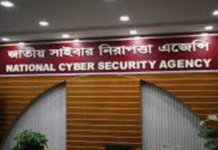Expert finds it as costly option, and also doubtful about usefulness

The Election Commission is planning to install video cameras in all the 44,021 polling stations across the country during the 10th parliamentary elections as part of its efforts to ensure strong monitoring.
Sources at the commission said if the plan goes well the commission will need some 45,000 video cameras as, according to the EC secretariat estimate, there will be 44,021 possible polling centres in the next general election due by January 24 next year. There were over 35,000 polling centres in the 2008 national election.
Nearly 1,000 fresh polling stations will be set up as the country has got over one new crore voters after the ninth general election.
Prior to the ninth general election in 2008, some 8.16 crore names were listed as voters with photographs with the help of the Bangladesh Army. Later, the electoral roll was updated twice. The number of voters rose to 9,21,98,029 after the inclusion of over 70 lakh fresh voters during the countrywide voter list updating exercise throughout the year in 2012.
On August 27, in a meeting with the representatives and foreign diplomats, led by UN Resident Coordinator in Bangladesh Neal Walker, Chief Election Commissioner (CEC) Kazi Rakibuddin Ahmad asked them to assist the commission providing it with sophisticated video cameras.
The representatives of the donor agencies under a platform of UNDP assist the EC financing the latter’s project of Strengthening Election Management in Bangladesh (SEMB).
After the meeting participated by 14 representatives of the donor agencies, the CEC told reporters that the commission sought the video cameras from the donor agencies to record the voting situation in each polling station so that miscreants cannot resort to unfair means.
The representatives of the donors assured that they would consider providing such video cameras, he added.
The CEC said the commission got effective results from using closed circuit cameras in recent polls, including the elections to Narayanganj and Comilla city corporations, and Kapasia by-elections.
Now the EC deploys its own staff as observers alongside the local and foreign observers. The constitutional body also monitors the television channels to watch the elections.
Election Commissioner Md Shah Nawaz told UNB that they sought the video cameras from the donor agencies with a view to fending off any untoward incidents in polling stations.
About the use of video cameras, Prof Nazmul Ahsan Kalimullah, Chairman of Jatiya Nirbachan Parjabekkhan Parishad (Janinpop), said the use of such cameras will be a very costly option and expressed his doubt over its effectiveness.
There is doubt about providing enough technical experts and backup energy support to operate the cameras smoothly.
“It’s very costly to cover comprehensive electoral situation. A question also remains there how the plan can be implemented. And we aren’t sure whether it’ll be fully fruitful,” he told UNB over phone on Friday.
Earlier on October 30, 2011, the commission, headed by ATM Shamsul Huda, first use closed-circuit cameras in 20 polling centres out of 161 polling stations in the Narayanganj City Corporation election to record any untoward incident.
Later, closed-circuit television cameras were also installed in all the polling stations of Comilla City Corporation election on January 5 last year.
The commission, headed by Kazi Rakibuddin, installed the closed-circuit cameras in 43 polling centres out of 64 vulnerable ones in the Gazipur-4 (Kapasia) by-polls held on October 3 last year.
Source: UNB Connect









